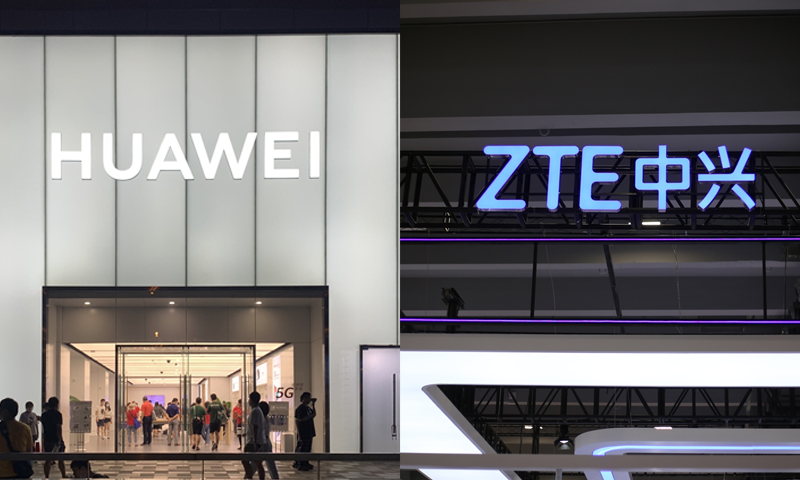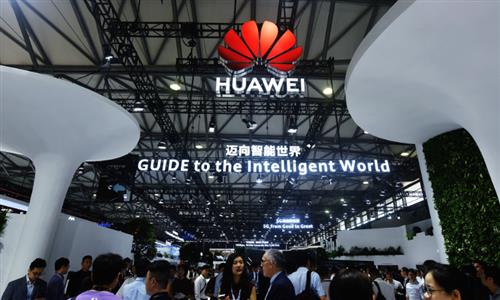Germany shouldn't make 'de-risking' turn into a real risk: Global Times editorial

Huawei and ZTE. Photo: VCG
According to "government sources" who spoke to AFP, Berlin is considering a ban on parts made by Chinese manufacturers Huawei and ZTE in its 5G networks from 2026, and the changes are "of high importance for the German government in terms of security policy." It is said that the ban will apply not only to new parts but also those that have already been installed. However, some media reports suggest that there is still internal disagreement within the German government because of concerns that such a move could further hinder Germany's already lagging digitalization process. Similar reports occasionally emerge, but to date, there has been no conclusive decision, highlighting the hesitation, internal conflicts, and contradictions within the German government on this issue.
The ostensible reason for restricting or even banning Huawei and ZTE has always been the so-called "national security issue." However, for a long time, the departments, institutions, and individuals advocating for these restrictions or bans have failed to produce any evidence of security risks or other violations. From 2019 to the present, Huawei and ZTE have faced the most rigorous scrutiny in the West. These entities have been conducting exhaustive searches with a magnifying glass, looking for any faults with Huawei and ZTE. After putting in so much "effort" and yet yielding no results, doesn't that prove something? You can't find bones in an egg. The clamor for restricting or banning Huawei and ZTE is entirely driven by political factors as well as instigation and pressure from the US.
According to data from the German side, Germany currently has 82,000 mobile communication stations, of which approximately half are equipped with Huawei technology. Huawei accounts for nearly 60 percent of Germany's 5G network equipment, making a positive contribution to Germany's communication infrastructure construction. Insiders have revealed that excluding Huawei equipment from Germany's existing communication network will not only bring a huge cost of up to 5 billion euros ($5.3 billion), but also set back the already slow development of Germany's mobile communication technology by several years.
In early August, German magazine Der Spiegel reported that the "de-Huawei" process that Germany is considering is likely to have a heavy impact on its railway system. Replacing related facilities would cost about 400 million euros (approximately 3.15 billion yuan at the time) and will lead to many projects being extended by 5 to 6 years. If Germany restricts or bans Huawei and ZTE, these costs will ultimately be shared by German consumers.
How to build the 5G network ultimately lies with Germany itself. Choosing the right path benefits its own interests, while going the wrong way results in self-inflicted losses. If there are no valid reasons to exclude Chinese companies from the 5G network, it will not only incur the exorbitant cost of replacing equipment but also lead to missed opportunities to stand out in intense competition in the future, along with damage to Germany's reputation for fair market rules.
Perhaps there's an example that Berlin might consider. Under pressure from the US, Sweden issued a ban against Huawei in 2020. However, the strongest opposition to this ban came from Huawei's powerful competitor, the Swedish telecommunications giant Ericsson. Ericsson even used the threat of "leaving Sweden" at the time. The direct result of this ban was that Ericsson, which was initially in a very favorable position in the 5G business, suffered significant damage and failed to recover in the fierce global competition that followed. If a similar approach were taken against Huawei and ZTE in Germany, the damage could be even greater. This is actually very obvious.
As mentioned above, Huawei and ZTE's equipment components have proven their security, which is more convincing. The stability, reliability, and advancement of Huawei and ZTE's equipment in terms of technology, as well as their high cost-effectiveness, are undeniable facts. It is irrational to limit or ban Huawei and ZTE, even at the cost of self-harm. Deutsche Telekom on Wednesday said the mooted timeline on Germany imposing curbs on the use of Huawei in its network by 2026 were not realistic. It questioned the need to take action that could result in a significant drop in quality of service to customers. This represents a rational voice in Germany.
On the same day this news came out, the German Institute for Economic Research released a report showing a significant decline in Germany's total foreign investment in the first half of this year, but investment in China remains high and the proportion has further increased. The investment funds mainly come from profits earned in China. For Germany, Huawei and ZTE are not risks, and China is not a risk either. While the German political arena is blowing the "de-risking" wind, German companies have honestly voted with their feet. Germany is a country that advocates rationality and values science. We hope that it will continue to uphold these virtues when it comes to the Huawei and ZTE issues.



